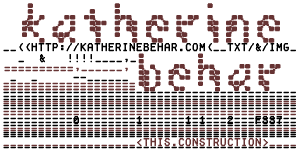
Title: Anonymous Autonomoous
Media: Modified office chairs, motors, sensors, custom electronics, custom software, computers, vinyl, paper, sound; variable dimensions
Year: 2024.
Exhibited:
- "Katherine Behar: Ack! Knowledge! Work!" Solo exhibition. Beall Center for Art + Technology. Irvine, CA, USA. February 3–April 20, 2024. Curated by Jesse Colin Jackson.
See also work in progress exhibitions.
Credits:
Fee Christoph: Creative technologist, software designer, and lead project engineer
Rebecca Cuomo: Hardware engineer
James Kennedy: Software engineer
Karthik Urs: Hardware designer and lead hardware engineer
Tom Bray: Duderstadt liaison and project facilitator
Version 2.0 contributors: Aian Cowart, software engineer and Michael Ploof, Tinkertech liaison and hardware engineer
Version 1.0 contributors: Gabe Cottrell, Tommy Martinez, David Sheinkopf with support from Bethany Tabor
Robot Caretakers at the Beall Center for Art + Technology: Ash Arias, Janis Choi, Thea Oldfield, Emily Tottori, and Ok Joo Yoo
Support:
Created in part through the generous support of the University of Michigan, in particular, the Penny W. Stamps School or Art and Design, the Institute for Research on Women and Gender (IRWG), the Center for Ethics, Society, and Computing (ESC), and the Robotics Institute, as well as Arts Engine and UROP.
Additional support for this project comes from MacDowell, a Pioneer Works Tech Residency, a PSC-CUNY Award jointly funded by the Professional Staff Congress and the City University of New York, the Robert Morris University Media Arts Visiting Artist Program, and the Weissman School of Arts and Sciences at Baruch College.
Special thanks: Irina Aristarkhova, Miriam Behar, David Cecchetto, Fee Christoph, Mark Kornbluh, Anna Kirkland, Jessica Lang, Guna Nadarajan, Damen Provost, and Christian Sandvig.
Photography: Yubo Dong, ofstudio photography
Timelapse: Jesse Colin Jackson
Press:
"A Network of Machines Speaking Only with Each Other"
by Chase Bucklew for Los Angeles Review of Books, April 19, 2024.
"Machines Cannot Replace Human Boredom"
by Renée Reizman for Hyperallergic, April 9, 2024.

















